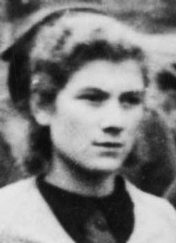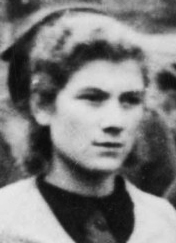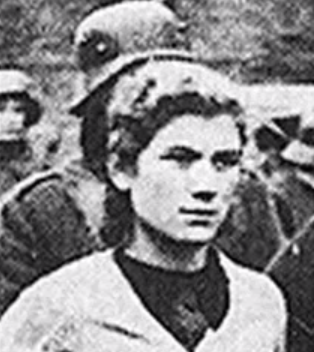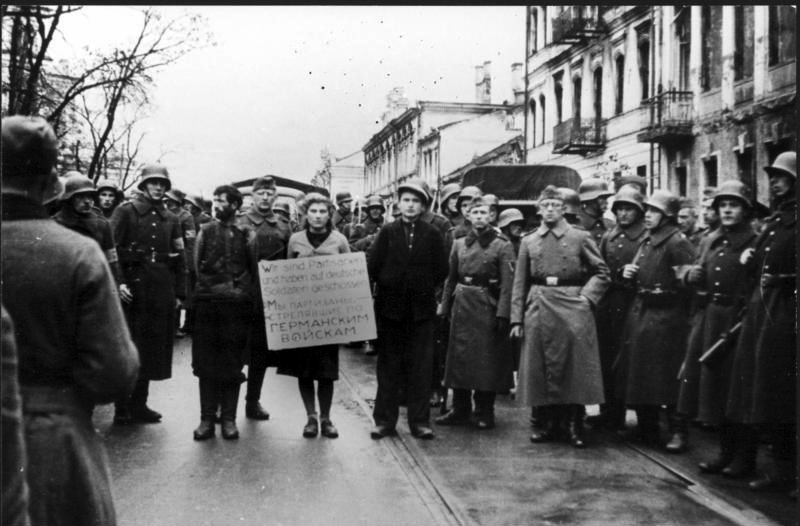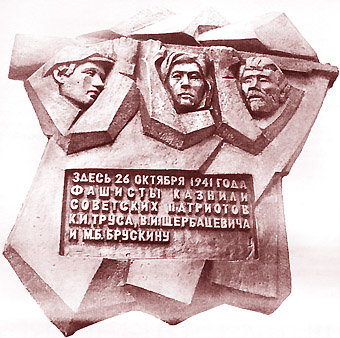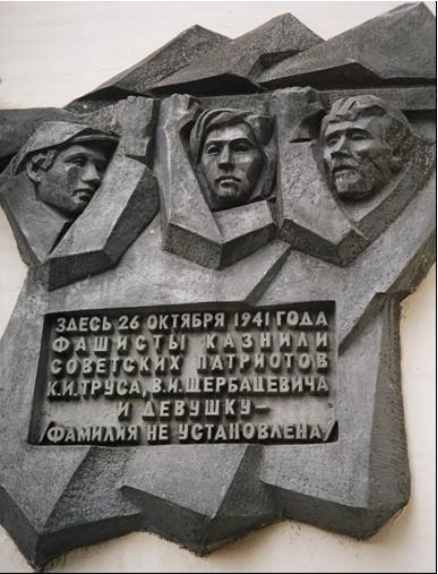She was was born in the Belarusian (then Soviet) city of Minsk in a middle-class Jewish family.
In the same city Masha spent her childhood, attended a primary and a secondary school and dreamt about an actress carreer.
But on June 22, 1941 Nazi Germany suddently invaded the Soviet Union and six days later the enemies were already in Minsk.
One of their first measure was to force almost 100 000 local Jews into a small and overcrowded ghetto before their complete extermination.
But some weeks later Masha Bruskina managed to escape this ghetto to go into hiding on the "Aryan side" of Minsk, where she lightened her dark brown hair, adopted the guise of a "Russian girl Anya" and later joined a local resistance group planning to liberate a group of fifteen wounded and captured Soviet Army officers from a prison hospital.
In this function Masha volunteered there as nurse smuggling in civilian clothing, medicine, and a camera to make false identity papers.
In mid-October 1941 the POW's set to flee.
Before this action a major, who should lead the escape attempt told the nurse "Child, for God´s sake, flee Minsk before it is too late !", but Masha refused to leave her comrades.
The ecapees could flee the city of Minsk, but two days later they were rounded up by a German patrol and immediately shot-except for a lieutenant, who saved his own life through betraying his rescuers, who were immediately detained by the Gestapo.
Having been brutally beaten and tortured in the jail, Masha revealed nothing to her captors and even kept a bitter sence of humour to tell a fellow prisoner "In any case, there is no chance I'll die of starvation."
And on October 20, 1941 she wrote a letter to her mother
"I am tormented by the thought that I have caused you great worry. Don't worry. Nothing bad has happened to me. I swear to you that you will have no further unpleasantness because of me. If you can, please send me my dress, my green blouse, and white socks. I want to be dressed decently when I leave here."
Before being executed, she was paraded through the streets with a plaque around her neck which read (in both German and Russian): "We are partisans and have shot at German troops", although they had actually not.
She and her fellow comrades (a grey-bearded WW I veteran Kirill Trus and 16-year old teenager Volodya Sherbateyvich) were hanged in public on Sunday, October 26, 1941 in front of a yeast brewery and distillery plant "Minsk Kristall" The Germans let the bodies hang for three full days before allowing them to be cut down.
After Masha´s execution her mother fell into insanity and was murdered by the occupiers together with other Jews of Minsk in November 1941.
Masha´s father Boris Bruskin survived the Holocaust as Soviet soldier and died many years later as lonesome and broken man, unable to honor his child, because after the liberation of Minsk the Soviet (and then post-Soviet) authorities published the photographs of the public execution worldwide, using them for the Nazi War criminal trials, documentaries, exhibitions and schoolbooks many decades long, with special emphasis on the young girl, but refused to admit that this girl was Jewish.
Only on 1st July 2009 the municipality of Minsk finallly amended the monument at the execution site and replaced the words "unknown girl" through "M. B. (Mariya Borisovna) Bruskina".
She was was born in the Belarusian (then Soviet) city of Minsk in a middle-class Jewish family.
In the same city Masha spent her childhood, attended a primary and a secondary school and dreamt about an actress carreer.
But on June 22, 1941 Nazi Germany suddently invaded the Soviet Union and six days later the enemies were already in Minsk.
One of their first measure was to force almost 100 000 local Jews into a small and overcrowded ghetto before their complete extermination.
But some weeks later Masha Bruskina managed to escape this ghetto to go into hiding on the "Aryan side" of Minsk, where she lightened her dark brown hair, adopted the guise of a "Russian girl Anya" and later joined a local resistance group planning to liberate a group of fifteen wounded and captured Soviet Army officers from a prison hospital.
In this function Masha volunteered there as nurse smuggling in civilian clothing, medicine, and a camera to make false identity papers.
In mid-October 1941 the POW's set to flee.
Before this action a major, who should lead the escape attempt told the nurse "Child, for God´s sake, flee Minsk before it is too late !", but Masha refused to leave her comrades.
The ecapees could flee the city of Minsk, but two days later they were rounded up by a German patrol and immediately shot-except for a lieutenant, who saved his own life through betraying his rescuers, who were immediately detained by the Gestapo.
Having been brutally beaten and tortured in the jail, Masha revealed nothing to her captors and even kept a bitter sence of humour to tell a fellow prisoner "In any case, there is no chance I'll die of starvation."
And on October 20, 1941 she wrote a letter to her mother
"I am tormented by the thought that I have caused you great worry. Don't worry. Nothing bad has happened to me. I swear to you that you will have no further unpleasantness because of me. If you can, please send me my dress, my green blouse, and white socks. I want to be dressed decently when I leave here."
Before being executed, she was paraded through the streets with a plaque around her neck which read (in both German and Russian): "We are partisans and have shot at German troops", although they had actually not.
She and her fellow comrades (a grey-bearded WW I veteran Kirill Trus and 16-year old teenager Volodya Sherbateyvich) were hanged in public on Sunday, October 26, 1941 in front of a yeast brewery and distillery plant "Minsk Kristall" The Germans let the bodies hang for three full days before allowing them to be cut down.
After Masha´s execution her mother fell into insanity and was murdered by the occupiers together with other Jews of Minsk in November 1941.
Masha´s father Boris Bruskin survived the Holocaust as Soviet soldier and died many years later as lonesome and broken man, unable to honor his child, because after the liberation of Minsk the Soviet (and then post-Soviet) authorities published the photographs of the public execution worldwide, using them for the Nazi War criminal trials, documentaries, exhibitions and schoolbooks many decades long, with special emphasis on the young girl, but refused to admit that this girl was Jewish.
Only on 1st July 2009 the municipality of Minsk finallly amended the monument at the execution site and replaced the words "unknown girl" through "M. B. (Mariya Borisovna) Bruskina".
Sponsored by Ancestry
Advertisement
Explore more
Sponsored by Ancestry
Advertisement
